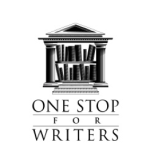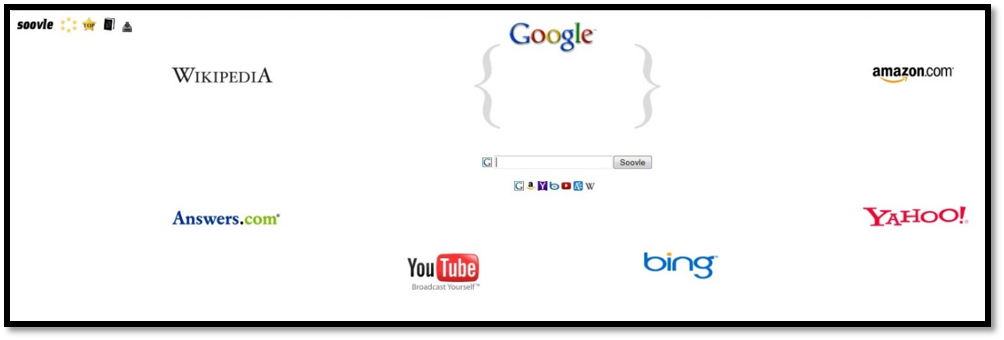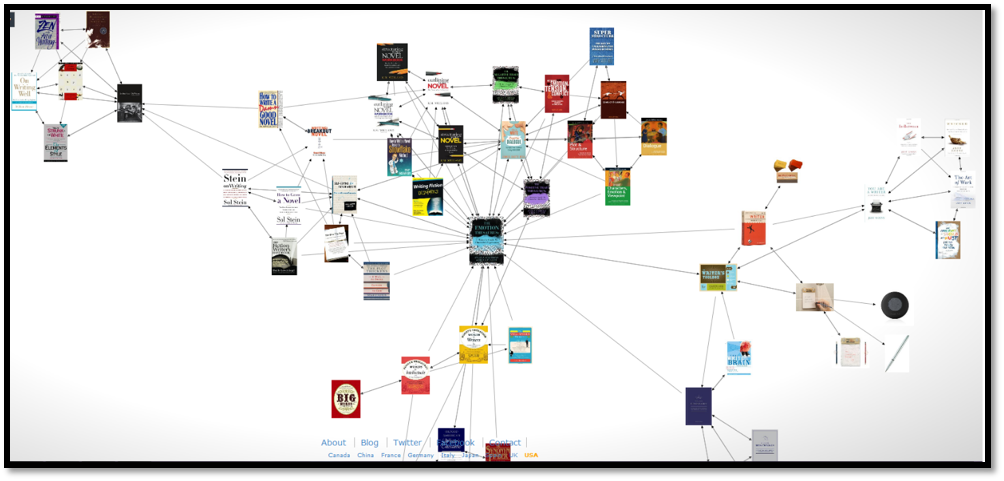
Today’s guest post, from writing coach and author Angela Ackerman (@angelaackerman), discusses techniques for identifying and connecting with your target reading audience.
Today’s writers have never had a more global reach; ebooks and digital distribution have made it easier for authors to find readers in other countries as well as their own.
Of course, the potential of a global readership only matters if an author knows how to access it, and this is where many marketing plans fall short. Given the endless buffet of books to choose from, it can be hard to get a book the attention it needs.
The Benefits of Fishing with a Smaller Net
It can be tempting for an author to rig a marketing freighter with big nets and start trawling for a readership. But your goal is not to seek out any old catch you can. To get the most out of your marketing efforts, you want to attract a specific type of reader suited to your book. This means you need to know who they are and where they hang out.
To Answer the Who, We Need the What
When it comes to understanding which readers are most likely to enjoy your book, you first need to look at what makes your book special, and this means thinking beyond genre, which is simply a guidepost to a readership. You must answer this question:
What makes my novel stand out from all others like it?
Let’s look at an example. The romance genre is by far the biggest. Yet, a reader of a steamy romance featuring a modern-day female pirate captain may not be as interested in a romance between an dog breeder and animal rescue worker who meet on the show dog circuit.
But you know who would read that romance? People who love dogs. Dogs, show dogs, the world of professional dog breeding—these are the unique elements that will attract a specific type of romance reader to this book. Once you understand the what, you know the who.
Authors tend to suffer book blindness when it comes to our own work. It can be difficult to see what sets your novel apart. If that special quality seems elusive, outsource and ask a few readers what really stood out to them as they read. Or, figure it out on your own. Here are a few ideas on what form this unique element might take:
- A theme or cause that commands attention: PTSD among war veterans, the tipping point of pollution and waste, terrorism on home soil, homelessness, cyber-bullying
- An area of interest: boating, falconry, ghost-hunting, ranching life, UFO sightings, tango dancing, life during WWII
- An intriguing character talent or skill: martial arts, empath abilities, archery, songwriting, eidetic memory, mentalism
- A specific passion or hobby: nonprofit work, sustainable living, medieval live-action role-play, coin collecting
- A stand-out element or concept: ciphers and code-breaking involved in a murder mystery, a rash of out-of-body death experiences taking place in a small town, a cult that practices cannibalism
Another clue to this special element is your research for the book. What information did you need? What websites are in your bookmarks? Or, what personal knowledge do you have that made research unnecessary? Often the special element is something you have a personal interest in, which is why you chose to include it into your story.
The Next Question Is Where
Once you know the types of people suited to your book based on a standout element, you need to figure out how to find them and which people are influential with this particular audience (businesses, bloggers, other authors, and organizations, to name a few). Ask yourself:
- What groups or organizations are involved in this special area?
- What businesses tie into this element?
- What blogs exist that tackle this interest or idea?
- Who is talking about this concept or thing online?
- What movies or TV shows focus on this element?
- What products cater to people interested in this special thing?
Armed with a list, head over to Google and search for leads. Think of keywords that will likely pull up big sites. Add +blog or +forum or +club or whatever gathering place or group you think might exist. If you need help with figuring out search terms, try Soovle. It will start with your subject of interest and show you the most popular search terms used at Wikipedia, Bing, Yahoo!, YouTube, and more.
Also, find books like yours, written by authors who you can possibly collaborate with in the future for marketing, and investigate how they connect with their audience and where. Chances are their readers are a good fit for your novel. If you need help finding books like yours, try Yasiv, which provides an image web of books Amazon users typically buy together. If your book is quite new and doesn’t have a lot of connections yet, find one like it and use that title as the reference point. Here’s one of mine so you can see how it works:
When looking for an audience, try also thinking beyond books. If “dragons in modern society” is your standout element, brainstorm what other businesses, artists, and organizations cater to this interest group (dragon lovers). Book promotion is great, but cross-promotion with a sister-industry can open up new audiences. In the case of dragons, there’s dragon fantasy art, dragon-themed merchandise (clothing, collectibles, games, etc.), movies, and TV shows—I even found a link to a dragon museum. And running an advanced search on Twitter shows people, hashtags, and groups that are actively talking about dragons.
Suddenly audience research gets a whole lot easier, doesn’t it?
Now Comes the Hard Part: Connection
Once you find potential audiences and influencers, you have to actively do something to reach them. And to be honest, this is the part where 80 percent of authors drop the ball. The reason is simple: connection takes time.
As we all know from the barrage of “buy my book!” promotions online, the direct sell doesn’t work. It’s white noise; we see so much of it in our Twitter and Facebook feeds, we just skip past it. And yet still authors do this spaghetti promotion day in and out because they’re looking for the shortcut solution to sales. All they’re really doing is wasting time—time that could be put into building a community.
Connection is simple: find like-minded people and start conversations. Ask questions. Comment, add value, entertain, discuss your common interest, share relevant links, and just be present and authentic. Choose the social media platforms, reading sites (like Goodreads), blogs, forums, and other communities where your audience hangs out and make it about them, not you. In other words, don’t treat them like your meal ticket. Get to know them. Show you care. Add to the community. Then, when a natural opportunity arises, share that you are an author, and when it sparks an interest, share your book.
With influencers, give first. Share their posts and links, work at raising their profile (and use their online handles on social media so they know). Leave comments and start conversations that show you are interested in helping them grow. Usually reciprocation happens naturally, and when the time is right, you can approach them about possible cross-promotion opportunities.
It really is that simple—and hard. It takes time, and a person has to be genuine. But ask anyone who is successful at this and she will tell you building a community that cares and invests in one another far outweighs costly ads, spaghetti promotion, or other tactics.
 The whole reason we write is to connect with people in a meaningful way, right? So, be yourself, enjoy the people you get to know, and trust the rest will follow.
The whole reason we write is to connect with people in a meaningful way, right? So, be yourself, enjoy the people you get to know, and trust the rest will follow.
You can visit Angela’s site, Writers Helping Writers, or check out her new project, One Stop for Writers, a library and brainstorming tool for authors.
If you’re interested in exploring this topic further, you might also enjoy this post: Finally, A Social Media Marketing Strategy That Puts You Right in Front of Your Target Market.



Terrific post, Angela! Thanks so much for all the tips. 🙂
My pleasure–thanks for stopping in 🙂
Wow, Jane and Angela. I always at least glance at the newsletter when it comes in and most of the articles pertain to my interests and needs in some way, but this one is a dead bullseye. Brilliant. It in myreading list AND bookmarked AND archived. I’m trying to resist printing it out “just to be sure.” A keeper. Obviously. Thanks so much.
Annie
Annie, very glad this one struck a chord. Marketing is a difficult area for many, especially the task of building an audience. I hope the strategies and tools here help out a bit. Be authentic, think about what your audience needs or will find interesting, and then provide it. Good luck! 🙂
This is excellent. I’ve been having a hard time figuring out how to market my current WIP and this has given me several ideas. Thank you very much. ^^
Glad to hear it Bran. I don’t know if it will give you some more food for thought, but I have a handout that looks specifically at putting on online events that will draw the right crowd and encourage engagement. If you like, here’s the link to the handout: http://writershelpingwriters.net/writing-tools/ Just scroll down to the handout section, and the Creative Book Launch Events For Social Media Platforms one. Best of luck! 🙂
That is perfect! Thank you so much! ^_^
[…] Are you an author frustrated by low sales and the difficult slog to building a readership? Swing by and check out the tools and strategies I discuss in my article at Jane Friedman’s blog: How Authors Can Find Their Ideal Reading Audience […]
[…] Writing coach and author Angela Ackerman discusses techniques for identifying and connecting with your target reading audience. […]
Awesome presentation of all the right stuff. Gotta try Sovle and Yasif, new to me. Thanks.
Thanks Jeff! There are so many ways these tools can be used. the ideas here just scratch the surface. Enjoy playing around with them, and finding good connections. 🙂
You can see from this post why Angela is the marketing arm of our partnership. She has such practical and realistic tips for connecting with a book’s audience. I especially love the Yasiv idea. Great ideas, Angela!
*blush* Thanks Becca! 🙂
Thank you for the information. I am constantly trying to find the right audience for some of my unpublished creative nonfiction pieces. I’m going to take your advice and start commenting and interacting with other like-minded authors that are writing about similar topics.
That’s great Britta! I hope this works well for you. I know I have met so many wonderful people online just be being me, no one special, just interacting and connecting and trying to pay things forward however I can. It is amazing the doors that can open when you just try to add more than you take, and be authentic in your interactions. We are very lucky as authors to have social media, and the support of all the people around us. Community is always a good thing. 🙂
Oh thank god! Confirmation that I should continue to connect where I feel authentic (and, in turn, I have found, inspired!) and forget all that other miserable spam-like crap! This is music to my ears. (Not that it’s entirely new; this is what I have gathered gently from Jane over the past few months. But it’s nice to be reminded and put sort of an exclamation point on it!) It’s also encouraging to feel validated regarding connection taking time. It’s hard not to stress about time not spent writing. Thank you! 🙂
You sound like you are in the right track, Laurie. 🙂 So many writers are in a huge rush and want to see sales now, Now, NOW and so get crazy with “buy my book” spam. As I said, it is just white noise and usually leads to a cycle of frustration. As you’ve observed, taking the time to get to know people on a real level is so worthwhile! We can learn and grow with others so much more than we can alone, and doors open when we are simply just present and available.
Find social media that works for you, that allows you to connect with the people you wish to. And use different social media mediums for different things–I find twitter for me is more an information sharing space, and facebook is much more personal. But that’s me. We have to find our comfort zone and then just start exploring how to create relationships. Wishing you continued success!
Angela, this is awesome info and I can use the same method to find my ideal blog readers. Although, I’m surprised you didn’t include the 1000 True Fans theory by Kevin Kelly. It would tie in well with your small net analogy.
It definitely does tie in, and yes, this works for a blog audience as well. In fact, how I started the connection ball rolling was through my blog, simply by providing the type of value and support I felt my audience needed but wasn’t getting elsewhere.
If you can identify a niche in a specific subject area that ties directly into your audience (delivering information, providing entertainment, offering something useful or valuable in a new way, etc.), it draws attention. 🙂 Happy blogging!